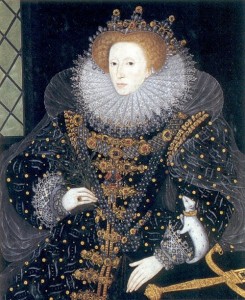
On 7th September 1533, at three o’clock in the afternoon and less than two weeks after she had taken to her chamber, Henry VIII’s second wife, Anne Boleyn, gave birth to her first child at Greenwich Palace (Palace of Placentia). The baby was a daughter and was “a beautiful infant with natural coloring […] beautiful perfection”,1 and the couple named her Elizabeth.
Although the pregnancy appears to have been difficult at times, with Lancelot de Carles writing that the King even wished the baby dead because of the pain Anne suffered, the birth itself was “without trouble” and “without extreme distress”2 and although the baby was not the expected boy, the couple must have been relieved that they had a living child. Anne had had a letter prepared giving thanks to God for sending her “good speed, in the deliverance and bringing forth of a prince”, so an ‘s’ was added. The celebratory jousts for a prince were cancelled, for it was traditional for celebrations for the birth of a princess to be low-key, but a herald proclaimed the good news, the Chapel Royal choristers sang a Te Deum and a lavish christening was planned. The birth had shown that Anne could carry a baby to term so there was plenty to celebrate.
Of course, this baby girl would become Queen Elizabeth I, “Gloriana” and the “Virgin Queen” and you can read more about her reign and her achievements in an article I wrote on the Elizabeth Files – click here.
Click here to read more about Anne Boleyn the mother.
Sources
- Ascoli, Georges, La Grande-Bretagne Devant L’opinion Française Depuis La Guerre de Cent Ans Jusqu’à La Fin Du XVIe Siècle, 233–34, De la Royne d’Angleterre, Lancelot de Carles, lines 171 and 173. Translated by Susan Walters Schmid in “Anne Boleyn, Lancelot de Carle, and the Use of Documentary Evidence”, Dissertation, ARIZONA STATE UNIVERSITY, December 2009.
- Ibid., lines 157 and 169.